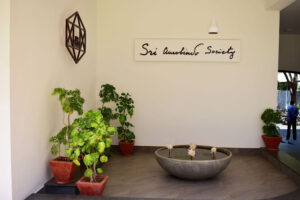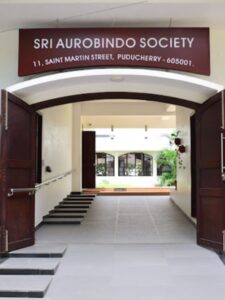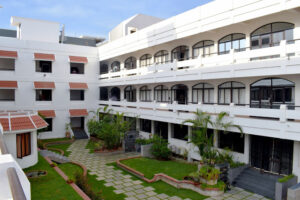Creating the Next Future
Sri Aurobindo Society is a not-for-profit NGO, working throughout the world for individual perfection, social transformation, and human unity in diversity. It is registered as a society at Kolkata India, under the Societies Registration Act of 1860 (now West Bengal Act XXVI of 1961). The main administrative office of the Society is in Pondicherry.
The Society works primarily in the areas of Education, Leadership & Management, Indian Culture & Rural Development and is recognized by the Government of India as
- A Not-for-profit Organization under Section 80G of the Indian Income Tax Act
- A Research Institute under Section 35(1)(iii)
- An Institution of National Importance under Section 10(23C)(iv)



Education: The Society manages nine schools in Bangalore, Patiala, Chandigarh, Jodhpur and Delhi. To orient teachers and parents to the concepts of Integral Education, the Society conducts training programs and prepares resource materials (books, audio & video CDs). In 2012, it collaborated with Hewlett Packard to manage a 1M USD Education Innovation Fund for India (EIFI) that includes institutes such as IIM, Ahmedabad.
Leadership & Management: To develop a holistic insight into the human factor of an organization, the Society conducts research in the field of business management. It facilitates training workshops and management programs, to corporates and public sector enterprises such as ONGC, NALCO etc., oriented towards deeper values while being fully responsive to present industry needs.
Indian Culture: To reveal their deeper spiritual dimensions of Indian culture and make various aspects of it relevant to modern times, the Society produces inspiring books and audio-visual material. A multimedia CD on Srimad Bhagavad Gita has been critically acclaimed. In April 2013, ‘Sanskrit for Children’, a National Seminar was organized by the Society in collaboration with Rashtriya Sanskrit Sansthan, New Delhi.
Rural Development: Since 2004, the Society has been involved with 7 villages in the Villupuram district of Tamil Nadu to develop a progressive village community model that is sustainable, replicable and scalable. Supported by Mondelez International, the Society is creating a Center for Sustainable Rural Transformation that has been chosen by the United Nations Environment Program (UNEP) as one of the most sustainable and green buildings in India.
For more details, visit http://www.aurosociety.org
